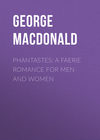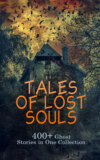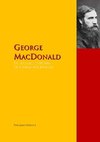Читать книгу: «David Elginbrod», страница 9
CHAPTER II. HARRY’S NEW HORSE
Spielender Unterricht heisst nicht, dem Kinde Anstrengungen ersparen und abnehmen, sondern eine Leidenschaft in ihm erwecken, welche ihm die stärksten aufnöthigt und erleichtert.
JEAN PAUL.—Die Unsichtbare Loge.
It is not the intention of sportive instruction that the child should be spared effort, or delivered from it; but that thereby a passion should be wakened in him, which shall both necessitate and facilitate the strongest exertion.
Hugh made no haste to find his pupil in the library; thinking it better, with such a boy, not to pounce upon him as if he were going to educate him directly. He went to his own rooms instead; got his books out and arranged them,—supplying thus, in a very small degree, the scarcity of modern ones in the book-cases; then arranged his small wardrobe, looked about him a little, and finally went to seek his pupil.
He found him in the library, as he had been given to expect, coiled up on the floor in a corner, with his back against the book-shelves, and an old folio on his knees, which he was reading in silence.
“Well, Harry,” said Hugh, in a half-indifferent tone, as he threw himself on a couch, “what are you reading?”
Harry had not heard him come in. He started, and almost shuddered; then looked up, hesitated, rose, and, as if ashamed to utter the name of the book, brought it to Hugh, opening it at the title-page as he held it out to him. It was the old romance of Polexander. Hugh knew nothing about it; but, glancing over some of the pages, could not help wondering that the boy should find it interesting.
“Do you like this very much?” said he.
“Well—no. Yes, rather.”
“I think I could find you something more interesting in the book-shelves.”
“Oh! please, sir, mayn’t I read this?” pleaded Harry, with signs of distress in his pale face.
“Oh, yes, certainly, if you wish. But tell me why you want to read it so very much.”
“Because I have set myself to read it through.”
Hugh saw that the child was in a diseased state of mind, as well as of body.
“You should not set yourself to read anything, before you know whether it is worth reading.”
“I could not help it. I was forced to say I would.”
“To whom?”
“To myself. Mayn’t I read it?”
“Certainly,” was all Hugh’s answer; for he saw that he must not pursue the subject at present: the boy was quite hypochondriacal. His face was keen, with that clear definition of feature which suggests superior intellect. He was, though very small for his age, well proportioned, except that his head and face were too large. His forehead indicated thought; and Hugh could not doubt that, however uninteresting the books which he read might be, they must have afforded him subjects of mental activity. But he could not help seeing as well, that this activity, if not altered in its direction and modified in its degree, would soon destroy itself, either by ruining his feeble constitution altogether, or, which was more to be feared, by irremediably injuring the action of the brain. He resolved, however, to let him satisfy his conscience by reading the book; hoping, by the introduction of other objects of thought and feeling, to render it so distasteful, that he would be in little danger of yielding a similar pledge again, even should the temptation return, which Hugh hoped to prevent.
“But you have read enough for the present, have you not?” said he, rising, and approaching the book-shelves.
“Yes; I have been reading since breakfast.”
“Ah! there’s a capital book. Have you ever read it—Gulliver’s Travels?”
“No. The outside looked always so uninteresting.”
“So does Polexander’s outside.”
“Yes. But I couldn’t help that one.”
“Well, come along. I will read to you.”
“Oh! thank you. That will be delightful. But must we not go to our lessons?”
“I’m going to make a lesson of this. I have been talking to your papa; and we’re going to begin with a holiday, instead of ending with one. I must get better acquainted with you first, Harry, before I can teach you right. We must be friends, you know.”
The boy crept close up to him, laid one thin hand on his knee, looked in his face for a moment, and then, without a word, sat down on the couch close beside him. Before an hour had passed, Harry was laughing heartily at Gulliver’s adventures amongst the Lilliputians. Having arrived at this point of success, Hugh ceased reading, and began to talk to him.
“Is that lady your cousin?”
“Yes. Isn’t she beautiful?”
“I hardly know yet. I have not got used to her enough yet. What is her name?”
“Oh! such a pretty name—Euphrasia.”
“Is she the only lady in the house?”
“Yes; my mamma is dead, you know. She was ill for a long time, they say; and she died when I was born.”
The tears came in the poor boy’s eyes. Hugh thought of his own father, and put his hand on Harry’s shoulder. Harry laid his head on Hugh’s shoulder.
“But,” he went on, “Euphra is so kind to me! And she is so clever too! She knows everything.”
“Have you no brothers or sisters?”
“No, none. I wish I had.”
“Well, I’ll be your big brother. Only you must mind what I say to you; else I shall stop being him. Is it a bargain?”
“Yes, to be sure!” cried Harry in delight; and, springing from the couch, he began hopping feebly about the room on one foot, to express his pleasure.
“Well, then, that’s settled. Now, you must come and show me the horses—your ponies, you know—and the pigs—”
“I don’t like the pigs—I don’t know where they are.”
“Well, we must find out. Perhaps I shall make some discoveries for you. Have you any rabbits?”
“No.”
“A dog though, surely?”
“No. I had a canary, but the cat killed it, and I have never had a pet since.”
“Well, get your cap, and come out with me. I will wait for you here.”
Harry walked away—he seldom ran. He soon returned with his cap, and they sallied out together.
Happening to look back at the house, when a few paces from it, Hugh thought he saw Euphra standing at the window of a back staircase. They made the round of the stables, and the cow-house, and the poultry-yard; and even the pigs, as proposed, came in for a share of their attention. As they approached the stye, Harry turned away his head with a look of disgust. They were eating out of the trough.
“They make such a nasty noise!” he said.
“Yes, but just look: don’t they enjoy it?” said Hugh.
Harry looked at them. The notion of their enjoyment seemed to dawn upon him as something quite new. He went nearer and nearer to the stye. At last a smile broke out over his countenance.
“How tight that one curls his tail!” said he, and burst out laughing.
“How dreadfully this boy must have been mismanaged!” thought Hugh to himself. “But there is no fear of him now, I hope.”
By this time they had been wandering about for more than an hour; and Hugh saw, by Harry’s increased paleness, that he was getting tired.
“Here, Harry, get on my back, my boy, and have a ride. You’re tired.”
And Hugh knelt down.
Harry shrunk back.
“I shall spoil your coat with my shoes.”
“Nonsense! Rub them well on the grass there. And then get on my back directly.”
Harry did as he was bid, and found his tutor’s broad back and strong arms a very comfortable saddle. So away they went, wandering about for a long time, in their new relation of horse and his rider. At length they got into the middle of a long narrow avenue, quite neglected, overgrown with weeds, and obstructed with rubbish. But the trees were fine beeches, of great growth and considerable age. One end led far into a wood, and the other towards the house, a small portion of which could be seen at the end, the avenue appearing to reach close up to it.
“Don’t go down this,” said Harry.
“Well, it’s not a very good road for a horse certainly, but I think I can go it. What a beautiful avenue! Why is it so neglected?”
“Don’t go down there, please, dear horse.”
Harry was getting wonderfully at home with Hugh already.
“Why?” asked Hugh.
“They call it the Ghost’s Walk, and I don’t much like it. It has a strange distracted look!”
“That’s a long word, and a descriptive one too,” thought Hugh; but, considering that there would come many a better opportunity of combating the boy’s fears than now, he simply said: “Very well, Harry,”—and proceeded to leave the avenue by the other side. But Harry was not yet satisfied.
“Please, Mr. Sutherland, don’t go on that side, just now. Ride me back, please. It is not safe, they say, to cross her path. She always follows any one who crosses her path.”
Hugh laughed; but again said, “Very well, my boy;” and, returning, left the avenue by the side by which he had entered it.
“Shall we go home to luncheon now?” said Harry.
“Yes,” replied Hugh. “Could we not go by the front of the house? I should like very much to see it.”
“Oh, certainly,” said Harry, and proceeded to direct Hugh how to go; but evidently did not know quite to his own satisfaction. There being, however, but little foliage yet, Hugh could discover his way pretty well. He promised himself many a delightful wander in the woody regions in the evenings.
They managed to get round to the front of the house, not without some difficulty; and then Hugh saw to his surprise that, although not imposing in appearance, it was in extent more like a baronial residence than that of a simple gentleman. The front was very long, apparently of all ages, and of all possible styles of architecture, the result being somewhat mysterious and eminently picturesque. All kinds of windows; all kinds of projections and recesses; a house here, joined to a hall there; here a pointed gable, the very bell on the top overgrown and apparently choked with ivy; there a wide front with large bay windows; and next a turret of old stone, with not a shred of ivy upon it, but crowded over with grey-green lichens, which looked as if the stone itself had taken to growing; multitudes of roofs, of all shapes and materials, so that one might very easily be lost amongst the chimneys and gutters and dormer windows and pinnacles—made up the appearance of the house on the outside to Hugh’s first inquiring glance, as he paused at a little distance with Harry on his back, and scanned the wonderful pile before him. But as he looked at the house of Arnstead, Euphra was looking at him with the boy on his back, from one of the smaller windows. Was she making up her mind?
“You are as kind to me as Euphra,” said Harry, as Hugh set him down in the hall. “I’ve enjoyed my ride very much, thank you, Mr. Sutherland. I am sure Euphra will like you very much—she likes everybody.”
CHAPTER III. EUPHRASIA
then purged with Euphrasy and Rue
The visual nerve, for he had much to see.
Paradise Lost, b. xi.
Soft music came to mine ear. It was like the rising breeze, that whirls, at first, the thistle’s beard; then flies, dark-shadowy, over the grass. It was the maid of Fuärfed wild: she raised the nightly song; for she knew that my soul was a stream, that flowed at pleasant sounds.
Ossian.—Oina-Morul.
Harry led Hugh by the hand to the dining-room, a large oak hall with Gothic windows, and an open roof supported by richly carved woodwork, in the squares amidst which were painted many escutcheons parted by fanciful devices. Over the high stone carving above the chimney hung an old piece of tapestry, occupying the whole space between that and the roof. It represented a hunting-party of ladies and gentlemen, just setting out. The table looked very small in the centre of the room, though it would have seated twelve or fourteen. It was already covered for luncheon; and in a minute Euphra entered and took her place without a word. Hugh sat on one side and Harry on the other. Euphra, having helped both to soup, turned to Harry and said, “Well, Harry, I hope you have enjoyed your first lesson.”
“Very much,” answered Harry with a smile. “I have learned pigs and horseback.”
“The boy is positively clever,” thought Hugh.
“Mr. Sutherland”—he continued, “has begun to teach me to like creatures.”
“But I thought you were very fond of your wild-beast book, Harry.”
“Oh! yes; but that was only in the book, you know. I like the stories about them, of course. But to like pigs, you know, is quite different. They are so ugly and ill-bred. I like them though.”
“You seem to have quite gained Harry already,” said Euphra, glancing at Hugh, and looking away as quickly.
“We are very good friends, and shall be, I think,” replied he.
Harry looked at him affectionately, and said to him, not to Euphra, “Oh! yes, that we shall, I am sure.” Then turning to the lady—“Do you know, Euphra, he is my big brother?”
“You must mind how you make new relations, though, Harry; for you know that would make him my cousin.”
“Well, you will be a kind cousin to him, won’t you?”
“I will try,” replied Euphra, looking up at Hugh with a naïve expression of shyness, and the slightest possible blush.
Hugh began to think her pretty, almost handsome. His next thought was to wonder how old she was. But about this he could not at once make up his mind. She might be four-and-twenty; she might be two-and-thirty. She had black, lustreless hair, and eyes to match, as far as colour was concerned—but they could sparkle, and probably flash upon occasion; a low forehead, but very finely developed in the faculties that dwell above the eyes; slender but very dark eyebrows—just black arched lines in her rather sallow complexion; nose straight, and nothing remarkable—“an excellent thing in woman,” a mouth indifferent when at rest, but capable of a beautiful laugh. She was rather tall, and of a pretty enough figure; hands good; feet invisible. Hugh came to these conclusions rapidly enough, now that his attention was directed to her; for, though naturally unobservant, his perception was very acute as soon as his attention was roused.
“Thank you,” he replied to her pretty speech. “I shall do my best to deserve it.”
“I hope you will, Mr. Sutherland,” rejoined she, with another arch look. “Take some wine, Harry.”
She poured out a glass of sherry, and gave it to the boy, who drank it with some eagerness. Hugh could not approve of this, but thought it too early to interfere. Turning to Harry, he said:
“Now, Harry, you have had rather a tiring morning. I should like you to go and lie down a while.”
“Very well, Mr. Sutherland,” replied Harry, who seemed rather deficient in combativeness, as well as other boyish virtues. “Shall I lie down in the library?”
“No—have a change.”
“In my bed-room?”
“No, I think not. Go to my room, and lie on the couch till I come to you.”
Harry went; and Hugh, partly for the sake of saying something, and partly to justify his treatment of Harry, told Euphra, whose surname he did not yet know, what they had been about all the morning, ending with some remark on the view of the house in front. She heard the account of their proceedings with apparent indifference, replying only to the remark with which he closed it:
“It is rather a large house, is it not, for three—I beg your pardon, for four persons to live in, Mr. Sutherland?”
“It is, indeed; it quite bewilders me.”
“To tell the truth, I don’t quite know above the half of it myself.”
Hugh thought this rather a strange assertion, large as the house was; but she went on:
“I lost myself between the housekeeper’s room and my own, no later than last week.”
I suppose there was a particle of truth in this; and that she had taken a wrong turning in an abstracted fit. Perhaps she did not mean it to be taken as absolutely true.
“You have not lived here long, then?”
“Not long for such a great place. A few years. I am only a poor relation.”
She accompanied this statement with another swift uplifting of the eyelids. But this time her eyes rested for a moment on Hugh’s, with something of a pleading expression; and when they fell, a slight sigh followed. Hugh felt that he could not quite understand her. A vague suspicion crossed his mind that she was bewitching him, but vanished instantly. He replied to her communication by a smile, and the remark:
“You have the more freedom, then.—Did you know Harry’s mother?” he added, after a pause.
“No. She died when Harry was born. She was very beautiful, and, they say, very clever, but always in extremely delicate health. Between ourselves, I doubt if there was much sympathy—that is, if my uncle and she quite understood each other. But that is an old story.”
A pause followed. Euphra resumed:
“As to the freedom you speak of, Mr. Sutherland, I do not quite know what to do with it. I live here as if the place were my own, and give what orders I please. But Mr. Arnold shows me little attention—he is so occupied with one thing and another, I hardly know what; and if he did, perhaps I should get tired of him. So, except when we have visitors, which is not very often, the time hangs rather heavy on my hands.”
“But you are fond of reading—and writing, too, I suspect;” Hugh ventured to say.
She gave him another of her glances, in which the apparent shyness was mingled with something for which Hugh could not find a name. Nor did he suspect, till long after, that it was in reality slyness, so tempered with archness, that, if discovered, it might easily pass for an expression playfully assumed.
“Oh! yes,” she said; “one must read a book now and then; and if a verse”—again a glance and a slight blush—“should come up from nobody knows where, one may as well write it down. But, please, do not take me for a literary lady. Indeed, I make not the slightest pretensions. I don’t know what I should do without Harry; and indeed, indeed, you must not steal him from me, Mr. Sutherland.”
“I should be very sorry,” replied Hugh. “Let me beg you, as far as I have a right to do so, to join us as often and as long as you please. I will go and see how he is. I am sure the boy only wants thorough rousing, alternated with perfect repose.”
He went to his own room, where he found Harry, to his satisfaction, fast asleep on the sofa. He took care not to wake him, but sat down beside him to read till his sleep should be over. But, a moment after, the boy opened his eyes with a start and a shiver, and gave a slight cry. When he saw Hugh he jumped up, and with a smile which was pitiful to see upon a scared face, said:
“Oh! I am so glad you are there.”
“What is the matter, dear Harry?”
“I had a dreadful dream.”
“What was it?”
“I don’t know. It always comes. It is always the same. I know that. And yet I can never remember what it is.”
Hugh soothed him as well as he could; and he needed it, for the cold drops were standing on his forehead. When he had grown calmer, he went and fetched Gulliver, and, to the boy’s great delight, read to him till dinner-time. Before the first bell rang, he had quite recovered, and indeed seemed rather interested in the approach of dinner.
Dinner was an affair of some state at Arnstead. Almost immediately after the second bell had rung, Mr. Arnold made his appearance in the drawing-room, where the others were already waiting for him. This room had nothing of the distinctive character of the parts of the house which Hugh had already seen. It was merely a handsome modern room, of no great size. Mr. Arnold led Euphra to dinner, and Hugh followed with Harry.
Mr. Arnold’s manner to Hugh was the same as in the morning—studiously polite, without the smallest approach to cordiality. He addressed him as an equal, it is true; but an equal who could never be in the smallest danger of thinking he meant it. Hugh, who, without having seen a great deal of the world, yet felt much the same wherever he was, took care to give him all that he seemed to look for, as far at least as was consistent with his own self-respect. He soon discovered that he was one of those men, who, if you will only grant their position, and acknowledge their authority, will allow you to have much your own way in everything. His servants had found this out long ago, and almost everything about the house was managed as they pleased; but as the oldest of them were respectable family servants, nothing went very far wrong. They all, however, waited on Euphra with an assiduity that showed she was, or could be, quite mistress when and where she pleased. Perhaps they had found out that she had great influence with Mr. Arnold; and certainly he seemed very fond of her indeed, after a stately fashion. She spoke to the servants with peculiar gentleness; never said, if you please; but always, thank you. Harry never asked for anything, but always looked to Euphra, who gave the necessary order. Hugh saw that the boy was quite dependent upon her, seeming of himself scarcely capable of originating the simplest action. Mr. Arnold, however, dull as he was, could not help seeing that Harry’s manner was livelier than usual, and seemed pleased at the slight change already visible for the better. Turning to Hugh he said:
“Do you find Harry very much behind with his studies, Mr. Sutherland?”
“I have not yet attempted to find out,” replied Hugh.
“Not?” said Mr. Arnold, with surprise.
“No. If he be behind, I feel confident it will not be for long.”
“But,” began Mr. Arnold, pompously; and then he paused.
“You were kind enough to say, Mr. Arnold, that I might try my own plans with him first. I have been doing so.”
“Yes—certainly. But—”
Here Harry broke in with some animation:
“Mr. Sutherland has been my horse, carrying me about on his back all the morning—no, not all the morning—but an hour, or an hour and a half—or was it two hours, Mr. Sutherland?”
“I really don’t know, Harry,” answered Hugh; “I don’t think it matters much.”
Harry seemed relieved, and went on:
“He has been reading Gulliver’s Travels to me—oh, such fall! And we have been to see the cows and the pigs; and Mr. Sutherland has been teaching me to jump. Do you know, papa, he jumped right over the pony’s back without touching it.”
Mr. Arnold stared at the boy with lustreless eyes and hanging checks. These grew red, as if he were going to choke. Such behaviour was quite inconsistent with the dignity of Arnstead and its tutor, who had been recommended to him as a thorough gentleman. But for the present he said nothing; probably because he could think of nothing to say.
“Certainly Harry seems better already,” interposed Euphra.
“I cannot help thinking Mr. Sutherland has made a good beginning.”
Mr. Arnold did not reply, but the cloud wore away from his face by degrees; and at length he asked Hugh to take a glass of wine with him.
When Euphra rose from the table, and Harry followed her example, Hugh thought it better to rise as well. Mr. Arnold seemed to hesitate whether or not to ask him to resume his seat and have a glass of claret. Had he been a little wizened pedagogue, no doubt he would have insisted on his company, sure of acquiescence from him in every sentiment he might happen to utter. But Hugh really looked so very much like a gentleman, and stated his own views, or adopted his own plans, with so much independence, that Mr. Arnold judged it safer to keep him at arm’s length for a season at least, till he should thoroughly understand his position—not that of a guest, but that of his son’s tutor, belonging to the household of Arnstead only on approval.
On leaving the dining-room, Hugh hesitated, in his turn, whether to betake himself to his own room, or to accompany Euphra to the drawing-room, the door of which stood open on the opposite side of the hall, revealing a brightness and warmth, which the chill of the evening, and the lowness of the fire in the dining-room, rendered quite enticing. But Euphra, who was half-across the hall, seeming to divine his thoughts, turned, and said, “Are you not going to favour us with your company, Mr. Sutherland?”
“With pleasure,” replied Hugh; but, to cover his hesitation, added, “I will be with you presently;” and ran up stairs to his own room. “The old gentleman sits on his dignity—can hardly be said to stand on it,” thought he, as he went. “The poor relation, as she calls herself, treats me like a guest. She is mistress here, however; that is clear enough.”
As he descended the stairs to the drawing-room, a voice rose through the house, like the voice of an angel. At least so thought Hugh, hearing it for the first time. It seemed to take his breath away, as he stood for a moment on the stairs, listening. It was only Euphra singing The Flowers of the Forest. The drawing-room door was still open, and her voice rang through the wide lofty hall. He entered almost on tip-toe, that he might lose no thread of the fine tones.—Had she chosen the song of Scotland out of compliment to him?—She saw him enter, but went on without hesitating even. In the high notes, her voice had that peculiar vibratory richness which belongs to the nightingale’s; but he could not help thinking that the low tones were deficient both in quality and volume. The expression and execution, however, would have made up for a thousand defects. Her very soul seemed brooding over the dead upon Flodden field, as she sang this most wailful of melodies—this embodiment of a nation’s grief. The song died away as if the last breath had gone with it; failing as it failed, and ceasing with its inspiration, as if the voice that sang lived only for and in the song. A moment of intense silence followed. Then, before Hugh had half recovered from the former, with an almost grand dramatic recoil, as if the second sprang out of the first, like an eagle of might out of an ocean of weeping, she burst into Scots wha hae. She might have been a new Deborah, heralding her nation to battle. Hugh was transfixed, turned icy cold, with the excitement of his favourite song so sung.—Was that a glance of satisfied triumph with which Euphra looked at him for a single moment?—She sang the rest of the song as if the battle were already gained; but looked no more at Hugh.
The excellence of her tones, and the lambent fluidity of her transitions, if I may be allowed the phrase, were made by her art quite subservient to the expression, and owed their chief value to the share they bore in producing it. Possibly there was a little too much of the dramatic in her singing, but it was all in good taste; and, in a word, Hugh had never heard such singing before. As soon as she had finished, she rose, and shut the piano.
“Do not, do not,” faltered Hugh, seeking to arrest her hand, as she closed the instrument.
“I can sing nothing after that,” she said with emotion, or perhaps excitement; for the trembling of her voice might be attributed to either cause. “Do not ask me.”
Hugh respectfully desisted; but after a few minutes’ pause ventured to remark:
“I cannot understand how you should be able to sing Scotch songs so well. I never heard any but Scotch women sing them, even endurably, before: your singing of them is perfect.”
“It seems to me,” said Euphra, speaking as if she would rather have remained silent, “that a true musical penetration is independent of styles and nationalities. It can perceive, or rather feel, and reproduce, at the same moment. If the music speaks Scotch, the musical nature hears Scotch. It can take any shape, indeed cannot help taking any shape, presented to it.”
Hugh was yet further astonished by this criticism from one whom he had been criticising with so much carelessness that very day.
“You think, then,” said he, modestly, not as if he would bring her to book, but as really seeking to learn from her, “that a true musical nature can pour itself into the mould of any song, in entire independence of association and education?”
“Yes; in independence of any but what it may provide for itself.”
Euphrasia, however, had left one important element unrepresented in the construction of her theory—namely, the degree of capability which a mind may possess of sympathy with any given class of feelings. The blossom of the mind, whether it flower in poetry, music, or any other art, must be the exponent of the nature and condition of that whose blossom it is. No mind, therefore, incapable of sympathising with the feelings whence it springs, can interpret the music of another. And Euphra herself was rather a remarkable instance of this forgotten fact.
Further conversation on the subject was interrupted by the entrance of Mr. Arnold, who looked rather annoyed at finding Hugh in the drawing-room, and ordered Harry off to bed, with some little asperity of tone. The boy rose at once, rang the bell, bade them all good night, and went. A servant met him at the door with a candle, and accompanied him.
Thought Hugh: “Here are several things to be righted at once. The boy must not have wine; and he must have only one dinner a-day—especially if he is ordered to bed so early. I must make a man of him if I can.”
He made inquiries, and, with some difficulty, found out where the boy slept. During the night he was several times in Harry’s room, and once in happy time to wake him from a nightmare dream. The boy was so overcome with terror, that Hugh got into bed beside him and comforted him to sleep in his arms. Nor did he leave him till it was time to get up, when he stole back to his own quarters, which, happily, were at no very great distance.
I may mention here, that it was not long before Hugh succeeded in stopping the wine, and reducing the dinner to a mouthful of supper. Harry, as far as he was concerned, yielded at once; and his father only held out long enough to satisfy his own sense of dignity.
Покупайте книги и получайте бонусы в Литрес, Читай-городе и Буквоеде.
Участвовать в бонусной программе




















